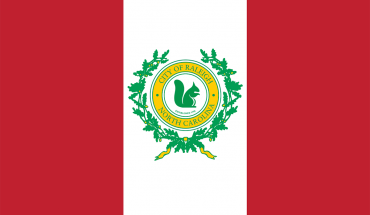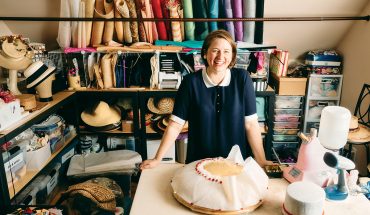A public-private partnership, the first of its kind in North Carolina, provides education and wellness support to Southeast Raleigh
by Catherine Currin | photography by Bob Karp

On the morning of August 26, 357 children will wake up for their first day at a brand-new school. But Southeast Raleigh Elementary School is not just any school—it’s different. Created as a public-private partnership between the YMCA of the Triangle and the Wake County Public School System with the support of Southeast Raleigh Promise, this Pre-K through 5th grade facility is adjoined with a new branch of the Y to offer not just education, but wraparound services to families that live in the Rock Quarry Road/Southeast Raleigh corridor.
The first of its kind in North Carolina, YMCA of the Triangle CEO Doug McMillan says that this partnership has been years in the making. “Six years ago, a new vision crystalized. YMCA of the Triangle Board members, community leaders and neighbors challenged us to provide opportunities for all in Southeast Raleigh and to think bigger than just a new YMCA facility.”

For decades, this area of Raleigh has been widely underserved: the unemployment rate is 50 percent higher than the rest of Wake County as is the number of single-parent households, plus the reading level of children is much lower than the city’s average. Southeast Raleigh YMCA Executive Director Dexter Hebert says that this initiative is just a step in the right direction. It’s been coined the Beacon site—describing its one-of-a-kind role in guiding this community forward. “We want to close the gaps of inequity and injustice. We want to engage and support and appreciate the diversity in people’s age, race, gender, income and education.” YMCA of the Triangle’s Senior Regional Vice President, Jon Mills, says that while the YMCA owns this land (a whopping 32 acres), it takes an entire community to get something like this done. “This project is a lot bigger than just the Y. When we refer to it as the Beacon site, I think everyone has made a commitment to be innovative and think creatively. While we’ve had programming in this area of town for decades, this site allows us to serve more people in a more tangible way.”

Forward-thinking facilities
Every detail of the 35,000 square-foot space is designed thoughtfully and deliberately. The wall of the lobby, which separates the school from the YMCA, is punctuated with vintage signage (salvaged from the Alexander branch) and dotted with scattered footprints of neighborhood residents, from work boots to tiny sneakers, earthcast by local artist Thomas Sayre. Every room is flooded with natural light. There are collaborative community spaces for the students, including an instructional kitchen and two large outdoor garden areas, plus two outdoor heated pools that will be utilized by both the YMCA and the school. “Every child will have swimming lessons built into their P.E. curriculum,” says Hebert, who notes that they plan to work with Southeast Raleigh High School to train students as lifeguards and swim teachers. While the students will enjoy the school facilities during the day, the Y hopes to open up the resources to the larger community as well, for cooking classes and other wellness programming.
The school’s incoming principal, Cheryl Fenner, was born and raised in Southeast Raleigh, and says that she feels a special connection to this place. “I am a product of the Wake County Public School System. I grew up in Southeast Raleigh, so there are a lot of allegiances to this area.” She was most recently the principal at nearby Fuller Elementary School and was the 2015 Magnet Principal of the Year. Fenner says that the school will be unique in many ways, especially in its Pre-K offerings. “The students in our four Pre-K classrooms will be guaranteed a space at the school. They will not be reassigned and will stay in a place that they’re already familiar with.” The YMCA section of the campus will operate as a traditional branch, with state-of-the-art fitness equipment and group class options, and if you’re a member of any Triangle Y, you’re also a member of this location. “I believe that with the YMCA addressing the health and wellness of our community, we can’t help but to help the entire city of Raleigh thrive,” says Fenner. “It will help create a more balanced society in Wake County.”

Wrap-around support
The Pre-K plan, along with the special offerings like cooking classes and swimming lessons, is part of a unique partnership based on a model created by Purpose Built Communities, a national network that partners with local organizations, in this case Southeast Raleigh Promise. The goal of the model is to “help create vibrant new communities where everyone has the opportunity to thrive”—and specifically in Southeast Raleigh, to break the cycle of intergenerational poverty. Fenner says that bringing more people to the table to share space, information and decisions can be crucial to making an impact. “You have to begin the process at the foundation, where you have the opportunity to shape and mold the students. The earlier you can get to the students and the families, the better.” Kia Baker, executive director of Southeast Raleigh Promise, says that her organization is the ‘community quarterback’ for this initiative, working on bridging the gaps in support through after-school programming, managing collaborations as well as generating additional funding. “As hard as our school system works to make sure everything is available, we help fill those gaps in funding. This includes things like paying for full-time school psychologists when budget only allows for part-time.”
Fenner says that the YMCA will be the framework that can provide more enrichment for the students at the school, including wellness facilities and after-school programming. “There is tremendous potential and brightness, but students really need a chance to demonstrate it. One of our focuses is to build awesome and courageous leaders.” The goal is to create a community-responsive school, she says. “What that means is we are working with our partners to address the holistic needs of the families that we serve in Southeast Raleigh. We believe in getting to the core, which means building solid relationships.”

People first
While the innovative facilities will lend to learning and wellness, Hebert believes that it’s the people who interact with the space—from students and teachers to fitness instructors and Y members—that will make this project a success. The Y’s mission statement, after all, is We Build People. “I’m most excited to bring communities together. Proximity is key: get people in proximity, then they get involved, and involvement leads to relationships. Relationships lead to empathy.” Hebert says it’s not just about donations and showing up, it’s about getting people from different backgrounds interacting with one another. He says to stay tuned for exclusive programs only offered at this branch, designed in part to draw people specifically to this Y, in this neighborhood, from other parts of Raleigh. “To me, this is a place that will represent what we as human beings are supposed to be to each other and for each other,” says Hebert.
Mills, who has worked at the Y for over a decade, hopes that this partnership serves as an example to other neighborhoods and communities: “We have an opportunity to do something that could be replicated across Wake County and across our state. It gives me hope. We can address very complex issues together, ones that we typically try to solve in our silos.” He says that the Y has built a significant and trusting relationship with this community over the past decade through YMCA programming in Southeast Raleigh like after-school care, Camp High Hopes and Community Hope Mentoring. Mills says that these impactful programs have ultimately led to this initiative.

Baker says she hopes this initiative is a big step forward in revitalizing this neighborhood, fostering the ‘cradle to career’ pipeline. “Our children and their families will now have a safe space to go. One of the issues that we have is that our young people don’t have safe or protective spaces where they can play and develop themselves.”
The next phase
By 2020, the Beacon campus will also include 120 units of affordable housing, sponsored by the Downtown Housing Improvement Corporation (DHIC). That happens to be the exact number of short-term rental rooms that were formerly at the Alexander YMCA on Hillsborough Street before its 2015 renovation. The development, Beacon Ridge, will include one-, two- and three-bedroom apartments that offer much more than just housing. Natalie Britt, DHIC Vice President of Real Estate Development says that this is a family property, taking advantage of its unique location and directing focus to kids and a family’s overall health by connecting families and individuals to the resources and training that lend to a healthier lifestyle. To that end, 75 seats across grade levels will be reserved at the elementary school for its younger residents. But Britt says the goal is to provide wraparound services for the entire family, not just the child. “I’m most excited about being able to follow the kids and families to see the progress that they make in school or health goals. Stable housing is just as important to better health as it is to education.” Fenner agrees, as family is also a focus of the elementary school: Teachers and staff have already met with many neighborhood families and will continue to keep them deeply involved throughout the school year.

Because this is a new model in Wake County, the team expects it to evolve as they go. They’re still figuring out, for example, the best ways to incorporate volunteers and interact with the community at large. “This is not traditional for us,” says Hebert. “It’s appreciating how all of these things interact and mix together. I hope we can learn and benefit from people from all walks of life.”
“A healthy Southeast Raleigh is a healthy Raleigh and a healthy Wake County,” Hebert says. “The sharing of space, sharing ideas, the intentionality behind how we serve the teachers, students and their families, as well as the membership base, is all wrapped up in that. The culture we create together at the Beacon site is going to be the most important piece to this initiative. If we can create that culture here, the future is bright for everybody.”



